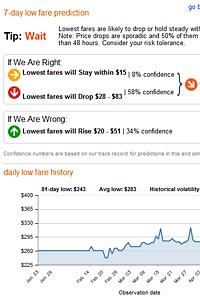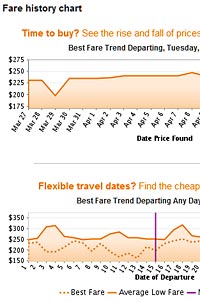When is the
Best Time to Buy an Airline Ticket?
Part 3 : Web Sites to Help You
Make the Best Choice
|
|
This screen shot shows the premise and promise of Bing's
website airfare predictor service.
Part three of a three part
article on When is the Best Time to Buy an Airline
Ticket - please
also visit
1.
Theoretical Considerations
2. Theory Put Into
Practice
3.
Web Services to Help You
|
It is usually unwise to buy the
first fare you find, on the first day you start looking for them
(assuming your travel is reasonably far in the future).
But at some point, the wisdom of
delaying until something better comes along switches to where
delaying further starts reducing your options and increasing your
likely fare cost.
Where is that crossover point?
It varies from city pair to city
pair, from season to season, and no-one really knows for sure.
But there are some websites that do a reasonably good job of
predicting if the airfare choices you see on any given day
are likely to get better or worse if you wait.
In this third part of our three
part series, we look at some of these websites and the help they
can provide you.
Internet Assistance
There are a wide range of
internet sites to help you with your travel research, but only a
very few that can help you guess the future.
The most useful site for
predicting future airfare pricing is the site formerly known as
Farecast, and now a part of the Microsoft/Bing search engine (this
is the first site reviewed below).
Several other sites give oblique information that might be of assistance, and then there's
an excellent site with a novel service. Unlike sites that
will track the airfare for your travels before you choose
to buy your ticket, Yapta will track your fare after you've bought
your fare. The reason for this - to help you claim a refund
if the airfare subsequently drops.
Bing Travel

Click image to open a larger
image of complete screen shot in a new window |
Microsoft's Bing search
engine has a travel feature which selectively provides airfare
predictions in terms of whether the fares it displays for any
given travel might go up or down or stay the same.
Bing says its predictions
are right about 75% of the time, and that the average person can
save about $50 on a typical fare by making use of their
predictions.
The service only applies to
select city pairs in the US and to/from Canada, and a limited
number of international destinations in Europe and the Caribbean.
For domestic travel in the US,
if the city pairs are featured in the service, it will provide
predictions for trips from 1 night to three weeks, and for travel
periods up to six months in advance.
For trips to or from Canada,
it will work between selected city pairs on travel ranging from 1
to 7 nights, and booked up to 90 days in advance.
For travel to Europe or the
Caribbean, it works on trips up to two weeks long, and booked up
to 120 days in advance.
Bing provides a helpful table
showing you the possible upside and downside to air fare
movements, and also a historical chart showing airfare pricing for
the last almost 90 days.
The prediction is useful, but
note the historical chart
information can be misleading, because airfare increases (or
decreases) can change the base levels of fares dramatically.
Just because you are seemingly paying top dollar, based on
historical data, doesn't also mean that, based on today's actual
data, it isn't also the lowest rate for today, so treat that
information with care.
Farereport.com
This website -
farereport.com - provides
interesting historical market data for some domestic city pairs,
telling you the average fare, the number of passengers flying the
route each day, the airline with the largest market share and the
airline with the lowest fare.
This is however historical
information rather than predictive information for the future, and
is culled from information submitted quarterly by the airlines to
the DoT, with fares on some 6,000 different routes (sounds like a
lot, but it is equivalent to a table with just under 80 cities in
it).
Kayak.com

Click image to open a larger
image of complete screen shot in a new window |
This is a great travel aggregator site, and has a fascinating
section kayak.com/trends
that gives information on what are becoming more or less popular
destinations.
It is unclear how you can use
this information for direct benefit in booking your flights, but
it certainly looks impressive and can cause one to spend a lot of
time browsing and daydreaming of places one would like to visit.
But there are sometimes
some fascinating nuggets of data - like the best time to book
Memorial Weekend travel is about 21 days prior to travel dates.
(That was surprising - many experts say that busy holidays
weekends need to be booked further in advance.)
It also has an option on many
flight searches, on the left side, to bring a pop-up window up
that shows a historical trend for the airfare price on the days
you want to travel, and also an across the month view of pricing
in case your dates are flexible.
Again, you are on your own
when it comes to predicting the future based on the past analysis
Kayak provides.
Yapta
Yapta has made a name for
itself with a wonderful extra service. In addition to a
fairly typical airfare search engine (it is actually a repackaged
version of Kayak) it offers a service that will watch the fare for
your flights, and if the fare drops after you have bought
the ticket, it will help you to secure a refund for the difference
between what you originally paid for the ticket and what it
subsequently is reduced in price to.
Does that sound too good to be
true? Well, once upon a time, this was exactly the way the
system worked - if an airfare sale came out, people who had
already bought their tickets at higher prices could get them
reissued for free at the lower price and get a refund of the
difference.
Imagine if you could go in to
your local supermarket and discover that steaks were on sale, and
if you could say 'Hey, I bought steaks a couple of days ago, can I
get a refund now' and be told 'Yes, of course'.
The airlines have tightened up
on this - quite understandably - and now it is typical for
airlines to charge a fee in such cases (although according to
Yapta, Alaska Airlines and Jet Blue will give you full refunds for
any price drops).
The airline fee ranges from
$75 up to $150, so unless there's a huge difference in price, or
you're flying on AS or B6, don't expect this to save you a huge
amount of money.
But Yapta's service is free,
and they say they save the average person $334 a year. You
may as well sign up for it and take advantage of it.
Note that it is not usually
sufficient merely for the airfare to drop, in order to get a
refund. Not only must the fare drop, but there must also be
available space, at the new lower fare, on the same flights you
are currently holding a ticket on.
Summary
Knowing when the exactly best
time is to buy your airfare is close to impossible. But
using the information on Bing's site tilts the odds substantially
in your favor, and using the information on Yapta's site slightly
covers your bet for if the fare drops subsequent to purchase.
There are many urban legends
about when to buy a ticket, but few of them apply, across the
board, to all markets and itineraries. For example, this
NY Times article starts off by quoting a claim that the best
time to buy a ticket is six weeks in advance, then ends up
rebutting that claim and pointing out all sorts of different 'best
times' that applied last year, depending on where and when you
wanted to travel.
As for the best times this
year or next, who really knows - perhaps even the airlines
themselves aren't exactly sure what their future plans may be.
Lastly, the best time to buy
an airfare - in the context of which day of the week/hour of the
day? One study, by
Farecompare.com, suggests 3pm Eastern time on a Tuesday.
That study also says never to
buy tickets more than 3.5 months prior to departure - advice that
contradicts the study reported in the NY Times article.
Ooops!
Read more in the rest of this
series
This is part three of a three
part article on When is the Best Time to Buy an
Airline Ticket - please
also visit
1.
Theoretical Considerations
2. Theory Put Into
Practice
3.
Web Services to Help You
Related Articles, etc
|
If so, please donate to keep the website free and fund the addition of more articles like this. Any help is most appreciated - simply click below to securely send a contribution through a credit card and Paypal.
|
Originally published
20 Apr 2012, last update
30 May 2021
You may freely reproduce or distribute this article for noncommercial purposes as long as you give credit to me as original writer.
|

